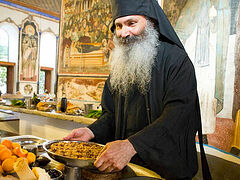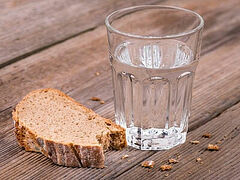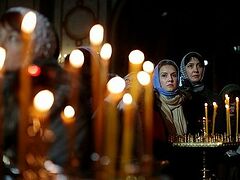As we embark on another of the Church’s fasting periods, it is interesting to read this treatise by the holy Patriarch Tikhon of Moscow, written at the turn of the twentieth century, when movements such a vegetarianism were just getting under way. His analysis is still helpful and relevant today, because attitudes towards fasting and vegetarianism have essentially remained unchanged.
***
It is true that abstinence in general and in part from meat, helps bridle our passions and fleshly lusts, gives our spirit great lightness and helps free it from reign of the flesh, bringing it under submission and rule of the spirit. Nevertheless, it would be a mistake to consider bodily abstinence to be the foundation of morality, to remove from it all its elevated moral qualities and think along with the vegetarians that “plant-based foods in and of themselves bring many virtues.”1 Contrary to the vegetarians’ dreams, one ascetic of piety (St. John Cassian), who of course we can in no way suspect of having contempt for fasting, over whom even the angels rejoiced when they saw what he ate. as St. John Chrysostom expressed it, said that “we do not place our hope in (bodily) fasting alone. It is neither a good nor a necessity in and of itself. It is observed with benefit for acquiring purity of heart and body, so that by deadening the sting of the flesh, man acquires peace of spirit. But fasting sometimes even becomes perilous for the soul if it is observed out of its proper time. We have to strive so that the virtues that make up true goodness be acquired through fasting, and not put the virtues to work solely for fasting. Thus, the benefit of humbling the flesh joined by healing abstinence from food comes with our acquisition through it of love, in which consists unchanging and constant goodness.”2
This means that bodily fasting serves only as a means and aid for acquiring the virtues of purity and chastity, and must be united with spiritual fasting—with abstinence from the passions and vices, and the departure from bad thoughts and evil deeds. But without this, fasting is not enough for salvation. We will not make a list on this of patristic writings, because it is hard to “contain the uncontainable”—all the fathers and ascetics agree in their teachings that true fasting happens when a person refrains from evil. Instead, we will only cite a characteristic story of St. Macarius the Great. The tempter himself once said to him: “I can’t conquer you, Macarius. Everything you do, I do also. You fast, and I don’t eat at all. You keep vigil, and I don’t sleep at all. There is only one thing you have that conquers me.” “What is that?” asked Macarius. “Humility,” answered the devil. “That is why I can’t conquer you.”3 From this we can see that we mustn’t place all our hopes in bodily fasting.
While they didn’t consider bodily fasting alone to be enough for salvation, ascetics of piety neither considered that their own fast should be mandatory for everyone, always (as vegetarians often do); for as St. Nilus of Sora said, “It’s impossible to subject all human organisms to one and the same rule: Different bodies are of differing strengths, like brass and iron in comparison with wax.”4 While preaching only constant temperance in food and drink and themselves abstaining from meat, they did not forbid others from eating meat from time to time. “We should partake of all to the glory of God,” they would say, “not putting aside anything completely, as the heretics do, who unreasonably reject what God has created as very good. We should take all foods we have, even the sweet, in small measure. This is the reasoning of the wise—so not that we do not choose certain kinds of foods and reject others, so that we might give thanks to God and keep our souls from conceit. Thus will we avoid pride and will not disdain what God has created as good.”5 Those people who get stuck on the material substance of food and drink, leaving “reason” on the sidelines, are people whom the fathers called “undiscerning”. These undiscerning people are zealous for fasting and the labors of the saints with wrong reasoning and intentions, and think that they pass the test of virtue. Meanwhile the devil, who watches them like prey, casts a seed into them of an elated opinion of themselves, from which the inner pharisee is born and cultivated, and gives them over to complete pride. For nothing so readily arouses pride as a conscience and mind that knows about one’s many merits, and lives in hopes on them.”6 Presbyter Isidore also addresses such people thus: “If you are laboring ascetically, then do not be proud; if you become vainglorious over it, then it’s better to eat meat, for it is not as harmful to eat meat as it is to be proud and look down on others.” And the fathers of the Synod of Gangra even pronounced anathema against those “who judge a person who, with reverence and faith, eats meat (except for blood and things offered to idols).”
This is the truly wise view of the Holy Church concerning eating meat. In its statutes it always has in mind not some sort of abstract, passionless, and discarnate person, whom various dreamers such as some vegetarians have in mind, but a living human being bearing flesh, a person with all his needs, requirements, and weaknesses; and to him the Church, following the example of its Divine Founder, relates with great condescension and mercy. There have been examples when great ascetics and holy men—the best expressors of ecclesiastical views, who “knew of human weakness”—not only did not criticize those who ate “inappropriate foods” during the fast, but even ate “a little” of them themselves.
Thus, it is told of St. Tikhon of Zadonsk that when he lived in retirement in the monastery of Zadonsk, once on Friday of the sixth week of Great Lent he visited the monastery’s schemamonk, Fr. Mitrophan. The latter had a guest, a certain Kosma Studenikin, a citizen of Elets, whom the saint loved for his pious life. It happened that on that day a fisherman they knew had brought Fr. Mitrophan a live carp for Palm Sunday. Because the guest did not count on staying in the monastery until Palm Sunday, the schemamonk had the carp cooked that day in soup and cold cuts. St. Tikhon found Fr. Mitrophan and his guest at this meal. Frightened by such an unexpected visit and considering himself guilty of violating the fast, the schemamonk fell at St. Tikhon’s feet and begged his forgiveness. But knowing the strict life of both of his friends, he said to them, “Sit down, I know you; love is greater than fasting.” At this he himself sat down at the table, ate a couple spoonfuls of fish soup and treated the others to it. Such condescension and kindness amazed his friends. After all, they knew that the holy hierarch Tikhon of Zadonsk did not even take oil on Monday, Wednesdays, and Fridays, never mind fish.7
And there is another story of one ascetic of piety who even during his lifetime was glorified by the gift of miracle working—St. Spyridon of Tremythous—which tells how a certain person came in to him from his travels at the beginning of Great Lent, when the saint and those of his household were according to custom keeping a very strict fast, taking food only on certain days, leaving all the rest completely without food. Seeing that the traveler was very tired, St. Spyridon asked his daughter to offer him something to eat. She answered that there they had no bread nor flour, since there was no reason to keep any around because of the fast. Then the saint prayed, asked forgiveness, and told his daughter to fry some salt pork that happened to be in the house. After it was fixed St. Spyridon sat the traveler down next to him, began to eat the meat and persuaded his guest to do the same. When the latter refused, calling himself a Christian, the saint said, “Nevertheless, there is no need to refuse, for the Word of God says: Unto the pure, all things are pure (Tit. 1:15).8
We don’t know whether vegetarians know about these incidents or how they would view them. But probably from the vegetarian point of view, these holy men would seem “weak”. However, the holy apostle Paul in his epistle to the Romans (Rom. 14:2), where there were also debates about whether to eat meats or vegetables, calls weak those who consider it only permissible for Christians to eat vegetables—and those who see eating meat as something immoral and criminal (as our vegetarians see it).
And truly, such a person is a weak Christian—ready, in the words of the apostle, to turn… again to the weak and beggarly elements, whereunto ye desire again to be in bondage (Gal. 4:9). Such a person thinks that food in and of itself can bring us closer to God (1 Cor. 8:8), as if the Kingdom of God were meat and drink and not righteousness, and peace, and joy in the Holy Spirit (cf. Rom. 14:17); he forgets that “everything is pure” (Rom. 14:20), and every creature of God is good, and nothing to be refused, if it be received with thanksgiving (1 Tim. 4:4). Therefore, it is not reprehensible to eat meat on those days when it is permitted by the Holy Church. When the human race first came into being, God appointed man to eat seeds and fruits (Gen. 1:29). But when man harmed his entire nature by sin and brought the curse upon the earth, then plant foods turned out to be insufficient for the human race; and from the Bible we know that after the Flood, God Himself gave people animals, birds, and fish as food to eat along with the green grasses (Gen. 9:3). It follows that the use of meat is permitted by God Himself,9 and as such, it does not contain any contradistinction or immorality.
But in killing animals for food, man thereby, according to the words of vegetarians, violates the principles of justice and compassion for animals. He deprives them of life, which man didn’t give them, and causes them such terrible sufferings that even people who are used to it get queasy when they see the torments that the animals suffer. In the writings of certain vegetarians10 there are whole pages devoted to graphic descriptions of the cruel torments inflicted on animals by man—that “pleasure-loving glutton”, “insatiable gourmand”, and “evil executioner”. Compassion is of course a feeling that is honorable in the highest degree, but only if it bears a sober and healthy character, and not a false and sentimental one. You can find ladies who faint at the whelping of a dog, but remain indifferent to the tears of a human being. Who would call such a feeling of compassion healthy and true? Or who would approve of the Hindus who set up hospitals for chickens and pigeons, while at the same time allow thousands [of the lower castes] to die during droughts, but will not let them use water from wells of the upper castes. In such cases, compassion and love for animals is developed at the expense of people and to their direct detriment.
This inadequacy of the Hindus, about whose religion the vegetarians are so elated, mainly because of their “high principles of mercy for animals”, is also inherent in vegetarianism. While defending the rights of animals, vegetarians, as they say, “have gone overboard”. Very many of them11 say that “animals are absolutely the same as man in the physical and moral sense”, and just like man, they are “bestowed with reason and moral feelings”, sometimes even “to a greater degree”, “have the same understanding, feelings, and abilities”;12 “animals are of the same class as humans”, “have the same rights to life as they do”, “they are our brothers”, and therefore killing them is “fratricide”.13
But by reasoning this way, vegetarians proclaim themselves advocates of materialism, which also does not see any essential difference between man and animal. And materialism has long ago lost all creditability in the eyes of the scientific world. There is not a single serious and dispassionate scientist who would try to insist that the inner world of the animals is the same as the inner world of humans.14
These materialistic tendencies cause great harm to the purity of vegetarian teaching, and we can’t but regret that instead of preaching their ideas in cooperation with the Holy Church and in the spirit of Christ’s teachings, vegetarians prefer to draw their views from the murky wells of false teachings.
From: Vegetarianism and How it Differs From Christian Fasting (Moscow: Novaya Kniga, 1996. ISBN 5-7850-0015-6.





